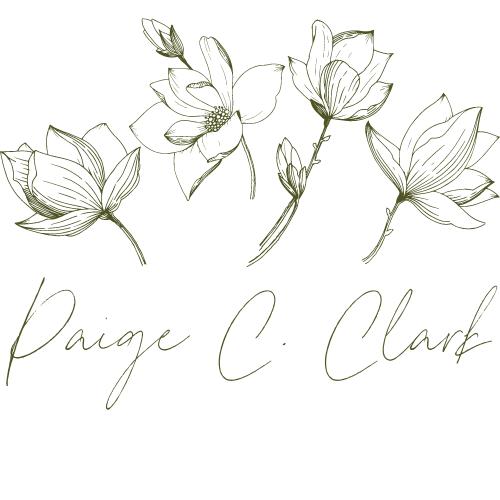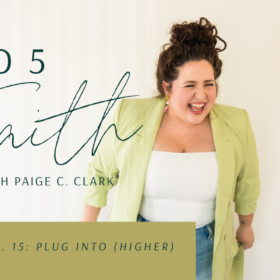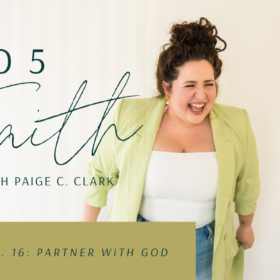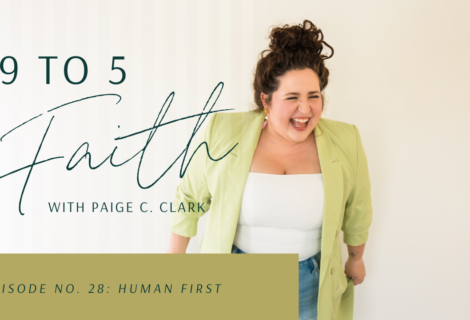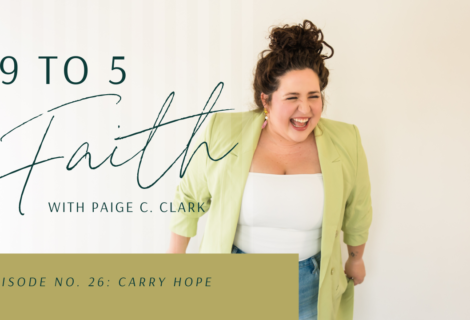This is a transcript from episode 13 of the 9 to 5 Faith Podcast with Paige C. Clark.
Share on Social
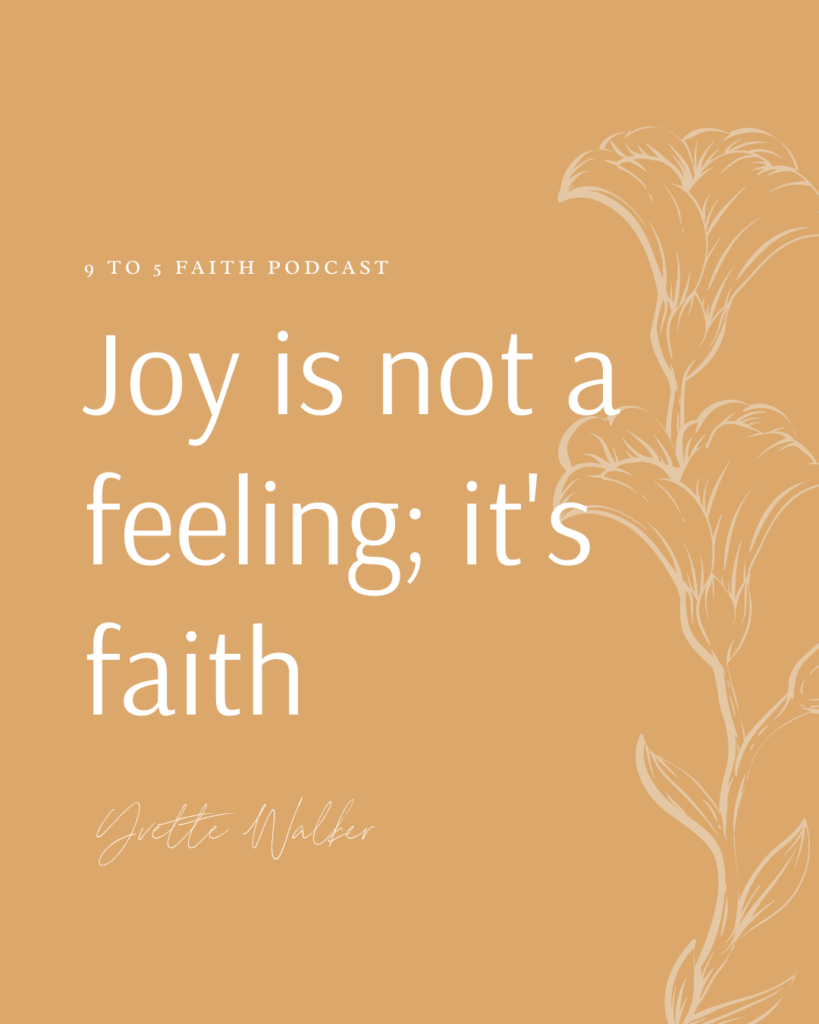
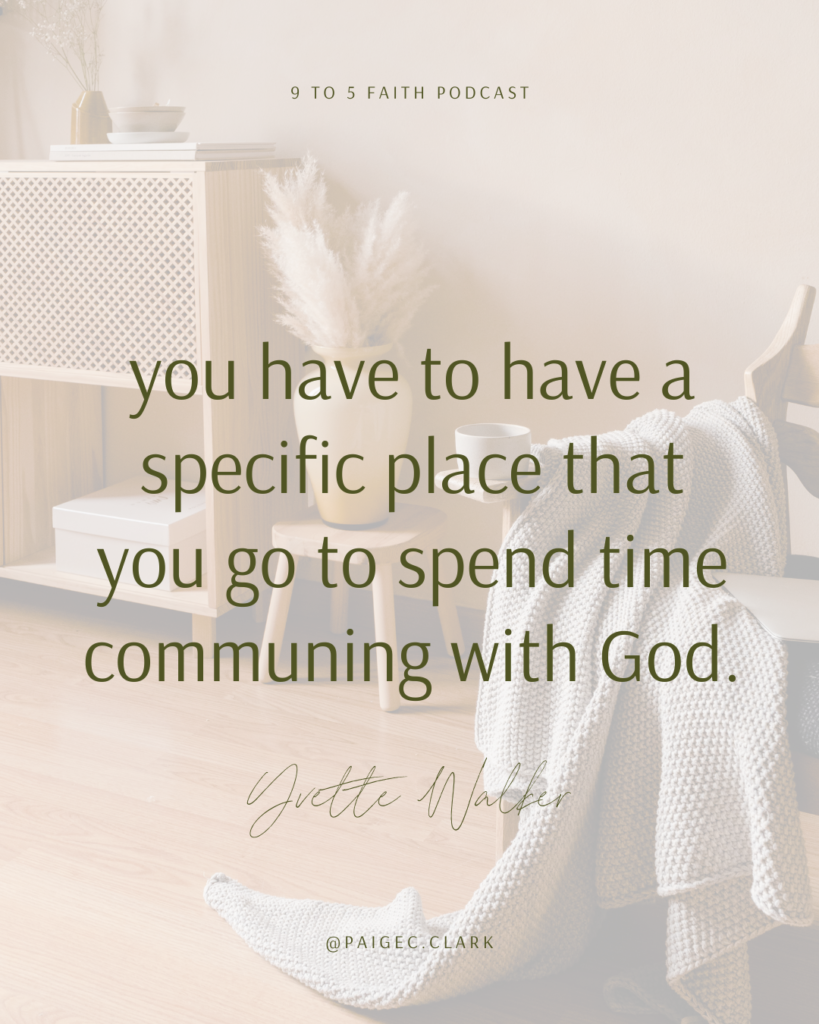
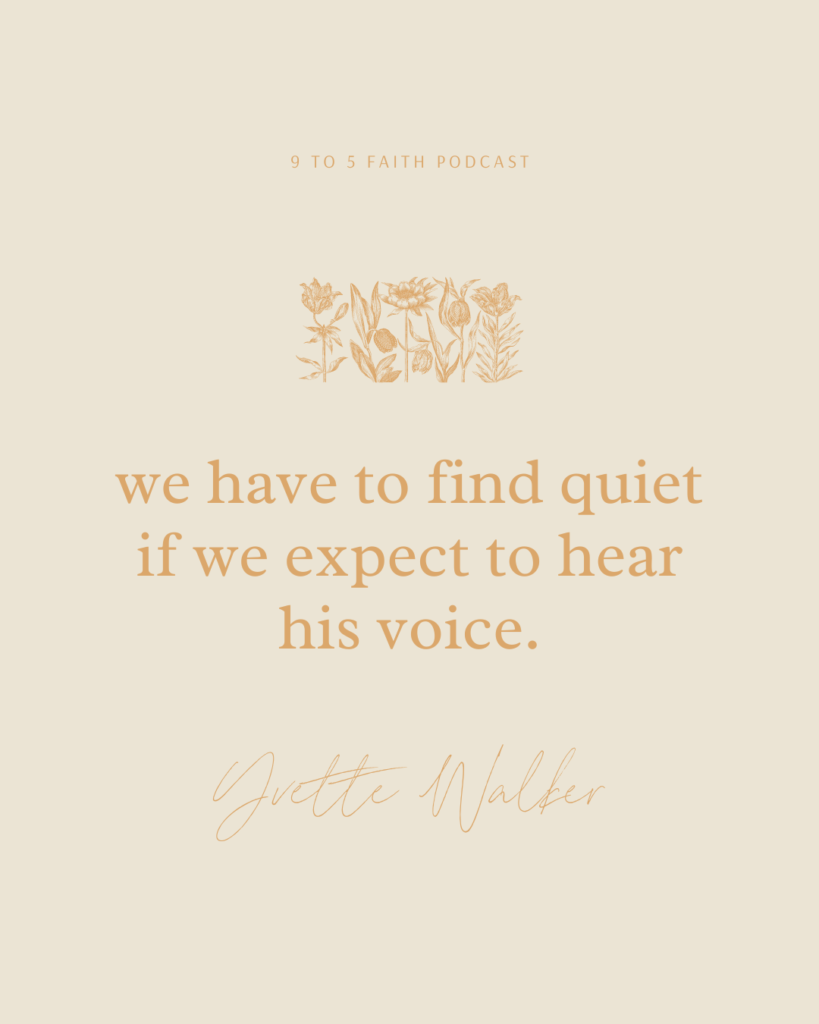
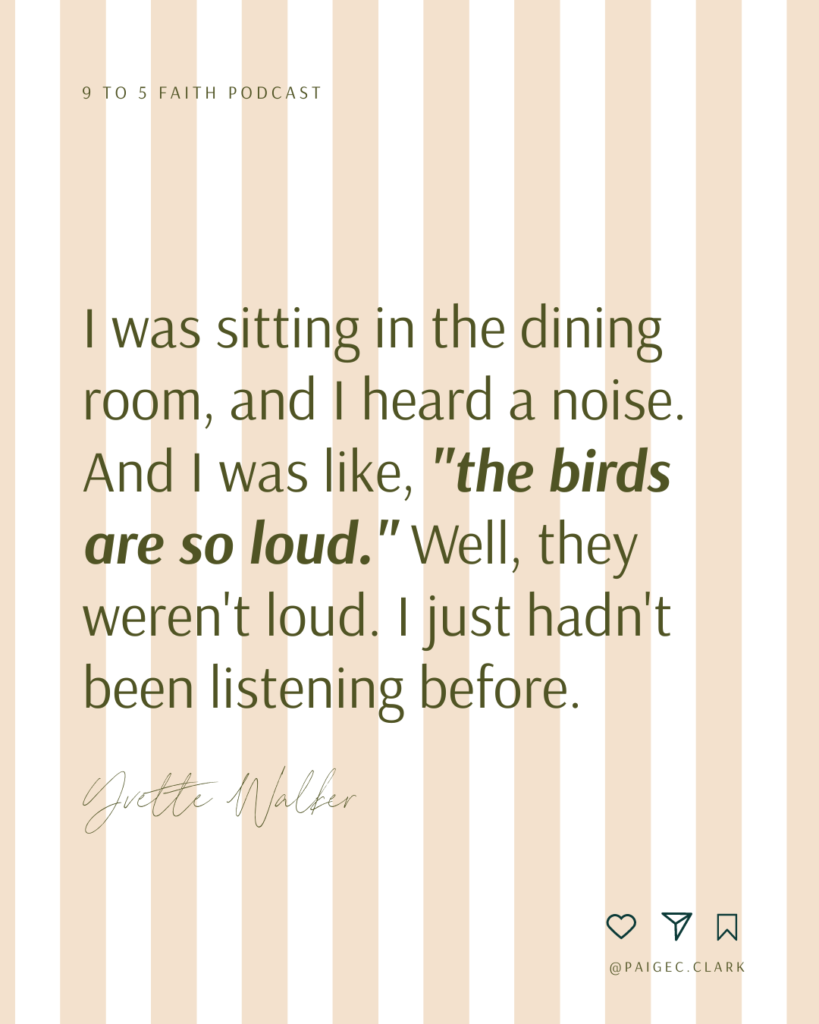
Start of Podcast
Paige C. Clark 0:41
Hello Hello, everyone, and welcome to another episode of the Nine to five faith podcast. I am here with a fellow podcaster Yvette Walker. How are you doing?
Yvette Walker 0:53
I am well. I just got home from work, and I’m really happy to be talking to you. Yeah,
Paige C. Clark 0:58
me too. And then, if you’re not watching the video version of this, she is like matching in an amazing way, like this a flaming red shirt and these beautiful red fire engine glasses,
Yvette Walker 1:12
and I signature color.
Paige C. Clark 1:13
Oh, is it? Here for it? Well, I’m like wearing my white T-shirt, you know? And you have the red lipstick to Oh,
Yvette Walker 1:22
yeah, I had to go put on that red lipstick.
Paige C. Clark 1:25
I love that. I love it. It’s very like Anna Wintour, who she’s like always with black sunglasses and wears like black capes and whatnot. But it’s like, pop in red.
Yvette Walker 1:35
Thank you so much.
Paige C. Clark 1:36
It’s wonderful. So fellow podcasters. Do you have a podcast called positively joy? Yes. Let’s talk about that.
Yvette Walker 1:46
Yeah, positively. Joy was born. During the pandemic, when a lot of other podcasts were born. I was actually going to do a podcast on hair and beauty. I’ve been wanting to do it. And it always seemed like there was just always something hanging me up. It was too difficult. I don’t know. But there I was at home; you’re very fortunate to be able to work from home. And I said this cannot be that hard. I should be able to figure out the software. And I did. I said, Okay, good. I’m gonna start this podcast. And then God said, Yeah, you’re gonna start a podcast, but it’s not going to be on here. It’s going to be on joy. And I’m like, Okay, Lord, because that’s what you say to God. But I really didn’t know what he wanted me to talk about other than joy. And I didn’t understand where it was coming from. And it’s funny because the name did not get picked. Until after, like, episode one or two. If you go back to, like, way back, because I’ve done about 200 episodes. Now. You go way back to episode number one; you will hear me say welcome to the finding joy podcast. But then I realized very quickly that there are a million shows that are either called finding joy or finding joy or something like that. And I said, now we’ve got to pick a different name. And I know we’re going to talk a little bit later about me being a former journalist; I work as an educator now. But in my mind, the Lord gave me this name, positive joy. And I said, No, Lord, that’s not grammatically correct. I am a bit of a word nerd. But that’s what he said. And so I said, Well, okay, we’re gonna do it. And it’s funny because a lot of people think it’s funny, or they think it’s catchy or whatever. So, right, you know, don’t question God.
Paige C. Clark 3:39
Yeah, I, I kind of got hung up on it a little bit. When I was like, repeating it back to you. I was like, it’s not positive Joy’s positively joy, which is also really interesting. I can go on a little showboat here. But, like, I like that approach because a lot of people assume Joy means happiness. Mm-hmm. And, like, right, adding the positive in front of it helps kind of reframe that mindset; at least, for me, it does.
Yvette Walker 4:09
I think it makes you kind of pause for a minute. Because this after I had been doing this for a while, he began to reveal to me, you know, really, what he what I feel like wanting me to communicate. And that’s just what you said, that the true joy of the Father is not how you feel. Right? In fact, its joy is not a feeling; it’s faith. And we can be walking in the valley, we can be in a bad spot. You know, he never told us that we were going to live pain-free or fear-free or anything like that. But, he guaranteed He promised us that he would be with us no matter where we were. And so we can find joy in that. And yes, I definitely, you know, people think joy is happiness. Being content, there’s a level of happiness and content. No. I think when you realize that he’s with you, even though your life has blown up, you know, and I definitely want to point out that I’m not belittling, or I’m not minimizing, people’s pain. But when we do, I mean, this happens; we do have things that go wrong in our life. We’re very fortunate if we don’t have something to go wrong. But often, he’s working. And us during those times, and there’s a level, you know, there’s a level of joy, I think we can take with us. And so that’s what we try to come to put out there in the ether, through the show. It’s an interview, mostly an interview show, because I love talking with people. And, you know, we tell some really great stories. Some stories are big and tragic, and other stories are not because that’s another thing I realized; as far as testimonies, you know, we play the compare game too much, especially when it comes to our testimonies. I know I did. And you know, for a long time, I was like feeling impostor syndrome, saying, Lord, my story isn’t as interesting or big as the person who lost a family member but was able to come back or the person who, you know, suffered an accident was able to still love you. You know, that’s not my testimony. But all our testimonies are so important. There’s something to learn in every single one of our stories because we’re all unique. And he made us that way.
Paige C. Clark 6:35
Yeah. Gosh, I love that. So let’s talk a little bit about you because I could talk about joy and the Lord’s sovereign nature all day long. But you’re an educator, a former journalist. Yeah. So let’s like, talk about, like, what you’re currently doing, and then like, I want to go into it.
Yvette Walker 6:56
Okay. Well, I am, you know, I’m probably more of an administrator now. But I do teach, okay. And I love teaching. I teach Intro to Media. I actually work at a Journalism College. So you know, I couldn’t get it. I couldn’t get too far away. Because I love journalism. It’s what I’ve done my entire career. So I work at a Journalism College where I’m, you know, I guess my main job is administrative. I do teach the intro class, and I also teach journalism ethics. And I love that. Because some people might argue there was no ethics in journalism, you know, that’s kind of like a, ya know, kind of like a joke. But I mean, there are lots of things that we do think about. So I, yes, I’m doing that now. And it’s, it heartens me; I feel great to know that there are all these young people who want to do this. They want to go to school for this. They want to write stories; they want to report stories. They want to serve as the watchdog for, you know, for citizens, for readers, and all that good stuff. The reason why I got into it, they still want that. So that’s really exciting.
Paige C. Clark 8:00
That’s like a really unique term that I’ve never considered before because I was a comms major but like a watchdog?
Yvette Walker 8:09
Oh, yeah. Jaren. Most journalists who get into this, they want to, and it’s not like we’re trying to say gotcha, all right, people, but we want, we want to be able to report stories, to help you live your best life, we want you to know what’s going on in your neighborhood in your community, we want you to know that they’re putting the Walmart in down the street. And if you don’t like that, you can go to the city council or city planning meeting, you know, we want you to know that we can, we can get copies of police reports. You can, too, by the way, but you just don’t know how to do it. Everybody, you know, there’s certainly, you know, we have rights to these things. But most people don’t know, so we can get a copy of the court transcripts. And we can get a copy of the police report and give you information that many, many cases, people don’t know they can do. So yeah, the watchdog term is a term that I think a lot of journalists kind of fell in love with journalism for that reason.
Paige C. Clark 9:07
Yeah. And I feel like it’s so fitting to, you know, whatever your opinion is of current journalism and news reporting, and whatever is out there. I feel like watchdog is the ideal, I guess, in its terms and how we want to be thinking about journalism. So that’s really interesting. So, you, former journalist, let’s talk about that. How did you start in that? How did you jump into that? And then also, we’re gonna get into, like, where you found God in that?
Yvette Walker 9:43
Right, right. Well, you know, like, I think a lot of journalists, I like to write. I’ve always liked to write when I was a little girl. I mean, you know, I called myself a word nerd a minute ago when I was a little girl. I would read the encyclopedia. I read the, you know, there’s like dictionaries that come with the encyclopedia, I would say those dictionaries, I would, I would create many newspapers, and I write like my own comic strips and like, put headlines on there. I mean, just, you know, as nerdy as can be. I just always knew that I wanted to do something like that. And then, you know, as I continued to grow up, and I realized, oh, yeah, I can actually, you know, major in that and, you know, get a job in that. And so, I think from the, from very, very early on, I knew that I wanted to do something like that. And so I worked on the high school newspaper and yearbook, Of course. Then I went to college and went to a college known for its journalism. Did internships while I was in college; I did internships, summer internships, at the Muskegon Chronicle in Muskegon, Michigan, and then the Yonkers Statesman, I think that’s the name of it, Herald Statesman, I’m sorry, if there are people in Yonkers listening, or watching, I used to, I shouldn’t know that. I shouldn’t know the name of that newspaper. I did that. And then graduated. And my first job out was at a newspaper in Gary, Indiana. So that was pretty much my career. But I will say this, there were some of those experiences in college that I wanted to do, like, I wanted to backpack across Europe or some of those things. And I was on a, I was on a track. So I had to, you know, do this and get the experience that I needed. So by the time I graduated, I knew that I would have a hell of a job waiting for me now, where God came in at the very beginning. So I was raised Catholic. So no matter what you feel about that, I was raised Catholic and went to church. Every Sunday, I went to Catholic elementary school and Catholic High School, and I never thought about whether or not I wanted to go to a Catholic college. But you know, again, journalism was driving me in that decision. I grew up in Chicago. And when I was very young, I would spend a lot of time in church. I mean, the church was like, a solace place for me, like, I could just go and sit down, and just be with God. And we would talk, and I felt like I could hear him. And so, ya know, it was great. I loved being at church; then you get older, you start getting involved in, well, what am I going to do? And where am I gonna go to college and boyfriends and all that? And I felt like I was, you know, getting more into the world because that’s kind of what happens; I still went to church and never stopped believing. But I felt like I was getting maybe farther and farther away from him. And until I couldn’t hear his voice anymore. And I don’t think I even realized that until many years later. And when it kind of hit me, I said, I can’t hear him anymore. And then that took me down another path that we can get into later. So ya, know, God was there at the very beginning, but journalism was too.
Paige C. Clark 13:03
Yeah, yeah, I love it. And, I think, I don’t know if it’s unique to people who are writers and whatnot because I am also a writer. And I remember the bookstore, like the children’s bookstore, being one of my favorite places to go. And I would write authors like authors of children’s books. Like when I was a kid, I probably have the letters somewhere, but it is ingrained in you like it is very core to who you are. So I definitely resonate with that. So when you were working in journalism, what were some of the struggles and some of the conflicts that you had, if any, with your faith coming into play in the workplace? Yeah.
Yvette Walker 13:55
So it’s so interesting, and I’m going to answer your question, but I just wanted to tell you that I, I find the whole concept of journalists and their faith. So interesting that I just started a new podcast, as I want to say just last year, called journalist advancing Ministry, and the day we’re talking, I just dropped a new episode. Basically, I’m finding that there are journalists who have moved into Ministry in some way. Yeah, I find that so fascinating. Because when I was in journalism, they were very much separate things. Your faith is separate from your job. Right? Um, when I was growing up, you know, and I was in Chicago, and I’m in Oklahoma. Now I feel like it’s easier to talk about God in Oklahoma for some reason. But in other places, I’ve worked, you know, you kind of didn’t do that. So I hear I was a young reporter covering police because that’s pretty much the first beat they give you. Either police or education. I don’t know why. Because it’s very, it’s well, and I say that because it’s very important. In concentration, people need to know what they’re doing. And they gave it to a brand new person. But you know, I saw people. I didn’t see people getting killed. But I saw dead people, I saw bodies, I had to cover murders had to I had to cover a serial killer. I did have to cover a courtroom proceeding of someone who had killed someone. And I do think that, and as I said, I just talked to someone in the episode that I dropped today. And I said, you know, what do you think? How did that affect you? And he had covered a murder. And he said one of my co-workers very kindly asked me if I was okay. And he says, You know, I was okay. And I’m not sure if it’s because I knew Jesus or if it was because I just, I was a crusty old reporter. But I think it was because I knew Jesus. Because I was okay. And when I didn’t, that was when the day came that I wasn’t okay. Where I felt like I was allowing myself to become numb to this kind of work, I left, and I moved to a different, I moved to a different newspaper, and I got a different job; I became a copy editor instead of a police reporter because I saw something happening. And I’m like, You’re too, you’re too young. I mean, I was just 25. You’re too young to be cold and jaded. And I feel like I was beginning to get that way. And I don’t think God wanted me that way, either. So right, but I quit that job and went to a different newspaper.
Paige C. Clark 16:32
Yeah. So let’s dig into that because I’m curious if that is the solution? Because ideally, we have, you know, workplaces filled with Christians, and you know, someone’s gotta do the job. So, you know, what I mean, not to like, not to shove off your experience or anything like that or invalidate it, I hear you, and leaving toxic environments is very important. And something I’m very passionate about, but how do we find or create workplaces that are able to balance both things at once?
Yvette Walker 17:17
So I think that at this time, you know, I’m, you know, it’s this is, this is my first job. I mean, I’m a young woman, right? So this is, yeah, that time. So this is my first job; I’m away from home. I’ve got friends, and I’m in. I’m not too far from home. I mean, it’s, you know, I’m in Chicago, and Gary, Indiana is not too far. But you know, I’m living on my own and, whenever you move to a different new job, a new city, you find a new church home. And so it could have been that I wasn’t fully involved in a church home at that time. Maybe I didn’t have the support. I don’t know. I mean, every time I moved, you had to find a new church home. And sometimes, I was very successful in finding one. And then, sometimes, I was not like when I went from Gary to Dallas; I was very successful in finding a church home. I mean, I’m still very good friends, with my church pals, from when I was in Dallas. And so I think it just kind of depends at that time. As I look back, perhaps, you know, whenever there’s a difficult time, I’m going to say I wasn’t leaning on God enough. And so I’m thinking perhaps, that was, and I think it kind of snuck up on me too with the serial killer. It was a man and a woman who were kidnapping young women. And in this case, they came to Northwest Indiana, and they kidnapped and killed two women. This one young woman, and really, I shouldn’t even say young woman, was a girl for some reason. I always thought they were going to find her and she was going to be okay, oh, they’re gonna find her, she’s gonna be okay. But then, when they didn’t, or they found her, and she wasn’t okay, that kind of rocked me to my core in a way that I didn’t expect. Yeah. And then the very next story that I covered was the murder of a Bible school teacher. And it just, again, that just rocked me. And I was like, I can’t do this anymore. I need to; I need to go now. Should I have stayed? Should I have found a way to work on that? Should I have talked to, you know, a minister or pastor and got some counseling? You have to remember, though, in journalism, you either stay in one place for a long, long time and work your way up to the top, or you move around and continue that climb. Yeah. And so for me, I moved around a lot to find new opportunities and to try to climb as high as I was going to climb. And so that was the last time I left the paper for another opportunity, but I very, I strongly remember that those two stories were like, I’m too young to feel like this? Yeah. Where am I going to be when I’m 40? Working? You know, working in the media. So, yeah, for sure me, and I feel like it was good, you know, I and I hear what you’re saying, Yeah, I
Paige C. Clark 20:17
don’t expect you to have the answer. And I don’t have the answer, either. I just, I just like to kind of push on these things, because I’m like, he’s there, like, like, real questions that we gotta we gotta face as Christ followers.
Yvette Walker 20:31
Absolutely. And but I would say anytime I was in a situation where it was tough, I would say, I wasn’t leaning on God enough. Yeah. And now and now, I actively seek the opportunity to lean on him. You know, I was, you know, I was, even though by the time I was 25, I’d been in church all my life. But I would say I wasn’t mature in my faith yet at that time.
Paige C. Clark 20:55
Yeah. And, and as you were talking, I was like, okay, like, community, like, what you have created this community, with your podcasts of journalists, who are also, you know, Christ followers and stepping into maybe ministry roles. Is that, potentially, a solution to that problem of, you know, being kind of torn down from a job that you’re trying to do, objectively, but you’re also a Christian?
Yvette Walker 21:28
Perhaps, you know, that’s one thing that I think we do wrestle with because we are, you know, the, the traditional teaching is you’re supposed to be objective and provide all sides of the stories, right. And you’re not supposed to bring your own point of view into the story. Now, we all know that there are lots of different kinds of journalism that do that. Analysis, advocacy, journalism, solutions, journalism. You know, there’s, there’s lots of journalism, where we understand that we are looking for a point of view or a solution, right truth, but traditional, traditional kind of hard news journalists, we don’t do that. And since that’s what I did for a lot of my career, I felt like I had to keep that part of me. Uh, you know, asleep while I was on the job, but I mean, as far as who I am, and encouraging people and building up people and just trying to be like Jesus, I mean, I’m always gonna do that. But does that translate to the work? And that’s kind of that’s, I have found that to be interesting.
Paige C. Clark 22:36
Yeah. When I found myself in jobs and roles where I might have to shut down that piece of myself. I always found it like, even more difficult to kind of, like, step back into the glory of God; I guess, like, it’s hard to turn off a switch and then actually get it back on; I think of like, a power breaker that like, the power breaker flips, and it doesn’t want to go back on. Did you ever find yourself in that kind of situation? And, like, how did you get through it?
Yvette Walker 23:12
Well, I would say the next time I began to want to wrestle with things, it was when I was in more of a management role, where I had responsibility for what was on the front page. And again, wanting to make sure that I was objective, and I was doing that. I mean, there weren’t, there weren’t stories per se, like, like, I didn’t have to make a decision about keeping a story about religion off the front page. That’s not what I’m talking about, right. But just talking about, like, for example, and one newspaper I worked at, there was a little girl that had been kidnapped. And they were trying to find her, and they found her body. And we, as journalists, talk about how to gently tell these stories because we are writing for a mass audience. And you know, we’re editing for a mass audience; we’re presenting the way the design looks. It’s all for a mass audience. And so we’re trying to be gentle about that. And I guess I would say that, in my faith, I definitely would want to, you know, be able to tell the story, but do so in a kind in, let’s say, Christian way, right, to be able to do that. And so, while I probably wouldn’t have those conversations, necessarily, that’s what it’d be in my mind because it makes up who I am. Yeah, so yeah,
Paige C. Clark 24:41
yeah, for sure. So let’s bring it back to the present. Are you interfacing with students? Are you guys in person? Are you teaching? Yeah,
Yvette Walker 24:50
yeah. Well, let me so sometimes we, sometimes we teach online, but we’re in person, we’re back. Okay.
Paige C. Clark 24:54
Oh, that’s so exciting because I feel like that like opens up a whole other realm to it. What does your face look like in your current role? And how you’re teaching ethics, journalistic ethics, you know how one how do you balance the two? And also, like, how are you able to, like, I guess, speak to the next generation of journalists that’ll be out there?
Yvette Walker 25:21
Well, I mean, I work at a public university this last night, the kinds of people, so I, you know, I don’t bring, I don’t bring my faith on the stage as except to say it’s part of who I am. Right. So what I saw in the ethics class is interesting because a lot of ethical principles are based on Judeo-Christian societal principles. I mean, that’s what made up this country. So you know, a lot of that, I mean, basically, I just tried to stick to the facts. I mean, I do, I do. But when we’re talking about morals and values, you know, you do have to reach into yourself, and I tell them to reach into whatever makes up, you know, them, and try and try to think, what do you think is the right decision here? What do you think? Is, is the best thing to do? How does it make you feel just because there is a, there’s a little bit of a gut check that you can take. And that’s an act that itself is actually part of a societal or not a societal, but part of ethical principles by sisal. Bach has a three-step way to look at things before you make a decision. Check your conscience; I call it a gut check. Yeah, then talk to somebody you trust. And then if you have time, or if you can take the conversation to like a larger, a larger conversation with stakeholders with people who have, who have something invested in the situation. But it starts with doing a gut check. And for me, you know, my gut check is going to my faith is going to be in there somewhere. And it might be in there with my students, too. You know, I don’t talk about faith in the classroom. But you know, but it’s, it’s part of who you are. The funny thing is I’m very active in my community church. And a lot of my students go to that church. So I will be serving fun, they’ll go, Oh, do you walk or Hi, so and they get a kick out of seeing me there? That’s awesome.
Paige C. Clark 27:25
And that was going to be my next question of, like, what does your faith look like, kind of outside of everything? And also, like, kind of was depth back a little bit? Because I, I only asked this question because I think it’s like good for context for the listeners to be able to see themselves in your shoes of, like, are you married? Do you have kids? Like what does that look like? Because also, I don’t have kids, but I am married. So like, my daily life might look radically different than someone who has, you know, four kids for absolutely,
Yvette Walker 27:59
I am married. And we do not have children. But we have two for kids. A black lab and a big cat. They both shed way too much. We’re both active in our church. We both serve. I have taken on a leadership role in my serving area. I just always do. Like if I go to church, and I start self-serving, I’m just gonna do it. You know, that’s just who I am. Yeah, there’s another, you know, so where we live now, which is where the university is, before that, I was living in another city nearby, and I was going to, you know, another church that I still hold very near and dear and sometimes I will attend that other church too. And I’m elector there. So I’ll read the Word at this other church just because I still love that church and I love reading the Word, and so sometimes what a Sunday morning I might go to do to services, we’ll see, you never know. But I primarily spend most of my time in town, and you know, I love serving, I love helping people I meet; we call it the GET TO KNOW desk. So it’s basically the info desk, helping people kind of get situated, knowing what to do, helping them sign up for baptism, which is always awesome. And one of the special things I get to do is if they find salvation and service, then they’ll come over, and then you know, we’ll pray and give the Bible, so that’s pretty awesome.
Paige C. Clark 29:32
That is awesome. So you’re a life educator and slash administrator. You’re running two podcasts. You’re also a writer on the side. You got your own book projects. How do you make sure that you find time with God?
Yvette Walker 29:52
That’s a really good question. And I tell other people how to find time with God, and sometimes I need to take my own advice because I will tell you this, the fact that I don’t have children makes it possible for me to do a lot of the things that I am doing because I realized it’s a lot. Right. And I very much appreciate the moms out there who have who don’t have as much time perhaps as I do. But I still need to make time. And so right now, you know, but there’s, there’s, there’s different ways of spending time with God. So there’s, you know, there’s reading the Bible, obviously really important. Right now, I’m doing a Bible plan. The Bible project has a plan for YouVersion. It’s my Bible in a year plan. Yeah, I’ve been. Yeah, they’re really, really great. I love, I love, I love the Bible project, and all their videos and their videos are interspersed with the readings. It’s awesome. I think they’re great. So right now, that’s what I’m doing. And that’s great. But that’s, that is not the same thing as taking a minute, go sit in my chair, where and I can take the Bible there, or I can take another book and just commune with Him. Turn off everything and just sit with God. And I will be honest with you, that I haven’t done that as much lately with all the projects as I would want to do and as I counsel people to do, yeah, so that is something that I am, you know, reminding myself right now just turn everything off and just go sit in that chair and just be with him.
Paige C. Clark 31:27
Yeah, and I think I think, too, that was, like, good. And he just answered my next question, which was like, What is the biggest struggle when it comes to practicing your faith? And I think I include that question because I want people to realize, like, we’re not all perfect. We don’t all have it together. And in very seriousness, like, I struggle, like, I struggle with quiet time, like, like, not just like, oh, this is my one on one quiet time, which like silence, I love being surrounded by noise, I love music, or the TV on or a podcast on like, I always love to be surrounded by noise. And so, like, absolute quiet is like what I really struggle with. And I don’t want anyone listening to this and be like, oh, man, like, I can’t do that. Or like, you know, my faith doesn’t look like that. Because guess what? None of us actually have it all together.
Yvette Walker 32:24
You’re absolutely right. We don’t. And that goes back to that imposter syndrome. Don’t feel like you have to have it. And there are so many different ways to do it. It’s okay; I’m like you. I like to be surrounded by a lot. I mean, I, I basically grew up in newsrooms. I mean, it’s busy, it’s crowded, it’s, you know, and now I’m with students who are always, you know, talking. So I’m very used to being around a lot of things and, finding quiet time, or even being in quiet, it feels strange, just like this isn’t normal. Like, what is this? And we have to find quiet if we expect to hear his voice. So I will say, the pandemic, in a lot of weird ways, allowed that quiet back into my life. Yeah, I remember. And I wrote about this. I remember being in the house, I was sitting in the dining room, and I heard a noise. And I was like, the birds are so loud. I mean, I remember saying that, why are these? Well, they weren’t loud. I just hadn’t been listening before. You know, so things like yes. I mean, there was just a lot of Revelation. And COVID. And I just, again, do not want to minimize people lost people. Right? Yeah, I still have long COVID. I mean, yes. That it was it was a very difficult time for a lot of people. Yeah. But there were other things that happened to, yeah, that happened to me. And so the beginning of the book came from that time; he just keeps giving me a lot of things to think about and to write. Again, I remember that just one day when the birds were just so loud, and I just thought something was weird. Like, what’s going on? No, they’re not weird. You’re weird. You haven’t been listening. And so I agree with you about turning things off. And the same thing at night when you go to sleep, just turning off your brain. I do. Listen, that’s when I do listen to my Bible plan at night. And sometimes, in the morning, there’s another it’s. Not it’s not YouVersion plan called Lectio 365, which is a year-long, wonderful audio app that I also very much enjoys. But I’ve also tried something called centering prayer, where you’re not really praying, but you’re trying to have just complete silence in your mind and become silent so that you can open your mind to His prompting; yeah, that is something else that I think is really important that we need to open ourselves to his prompting,
Paige C. Clark 35:07
yeah, and what you said about the birds. I’m just like, I want to have to chew on that for a while. Because, like, isn’t that true of, like, our relationship with God and how we listen to God is like, Isn’t his voice so loud? No, you just haven’t been listening to it. Right? Like,
Yvette Walker 35:26
yeah, yeah. And that is why so the first book that came out it’s called whispering in his ear. And I could have well been whispering in my ear. I really couldn’t write it, because I thought that he had stopped talking to me. When of course, that wasn’t true at all. I just stopped listening or forgot how to listen.
Paige C. Clark 35:45
Yeah, yeah. And one thing I do like to kind of associate, especially with younger believers, who are kind of trying to find their footing and everything. I always say, think about your relationship with your best friend. What do you do with them? Do you sit with them? Do you talk with them? Do you hang out with them? Do you learn about them? Do you do things that the other person likes? Do you do things that you like with them? And that is how your relationship with that person deepens. Now? What are you doing with that with God? Yeah. Because that’s how we have a relationship with God, we get to sit and do those things together and learn about him through Scripture.
Yvette Walker 36:35
And, you know, there’s always the mary martha comparison. And you know, so many of us were the Martha. We’re running around trying to get stuff done when in fact, we want to be the Marys.
Paige C. Clark 36:46
Yeah, for sure. And what you said about kind of the pandemic and everything, I’ve had a similar experience to what you had of like, and, again, with the caveat, I understand it was hard for a lot of people, I do have acquaintances who passed away during that period, and it is hard, and it is troubling. Also, I got a lot of blessings out of it. Especially, you know, not having kids. And me and my husband being held, like held up in our, in our house for, you know, months on end, I’m like, When else would I be able to have this time with him? Like, when else that there’s no, there’s no chance that that would look maybe when we’re retired. But also, I’m like, 60 years away from that, right, like, and so, you know, I always like to say, I’m kind of counter to people who say, like, God makes everything happen for a reason. I kind of hate that thing. And I’m like, No, God can make a reason happen out of everything.
Yvette Walker 37:58
Hmm, I like that. Because if you say God
Paige C. Clark 38:01
makes, you know, there’s a reason for everything. Or if God makes everything happen for a reason, you think God is, you know, like the puppet master. And then you’re like, Well, why is everything bad happening? Whereas God can make a reason out of everything that happens. That’s that he gets to restore it, and he gets to bring life back into it. So when I think of, like, the pandemic and everything, did God cause that to happen? Probably not. Like, I don’t. I don’t want to speak on behalf of God. But right, like, they’re like, we’re human, sinful factors going on? Maybe probably. But was he able to redeem relationships with himself, relationships with spouses, relationships, you know, with kids throughout that whole thing? Now? Salute That’s the coolest thing about God.
Yvette Walker 38:51
Yeah, no, I totally agree. I like you, your, the way you’ve turned around that expression? Because I think that makes that does make a lot of sense. Yeah. And we find ourselves in a lot of different situations. And you know, we do have free will. Yeah, and we can go one way or the other, or the other way or the other way. And, but if we allow him to do what he does, what only He can do, he can. Yeah, he can just change situations and turn things that were bad into good. And, and all of that, and I just think that we have to trust him. And as I said, open yourself. So when I say open yourself. I encourage people, and I mentioned this in the book, I encourage people to pay attention to the little things. To question things as, you know, I don’t believe in coincidences, just me personally. I don’t believe in coincidences. I do. I do think that things have then. And maybe it’s not for a reason, but you can, you can take whatever that is and do something with it. Yeah. So one example that talks about in the book is, I was getting ready for this very busy day; I had these two back-to-back events. And I had prepared. I had, like, all my taking my clothes with me because I wasn’t gonna be able to come back home. Everything is organized, ready for me to just take and go in the car, right? So I’m in the car; I’m about a mile away. When I realized I had forgotten a bag. I mean, how is that possible? Everything was there. And so that meant I had to make a decision, I missed the first thing or go back, go back really quick, and try to get to the first thing. I’d be late, but I could probably still make it. So as I’m thinking about this, I just happen to look over to my driver’s side seat. And there’s a there are two letters sitting in the seat. Now I’d written these letters about a week ago, I was supposed to mail them. Speaking of journalism, this was during the time of the wildfires in Australia. And journalists, the journalism world said, Hey, let’s all write these encouraging, inspirational letters to these Australian journalists that were working so hard. Yeah. So I wrote these two letters, and of course, mine were faith-filled. And I just had forgotten to mail them. So at that moment, I made a decision. I said, Okay, I can go home, get this bag that I missed, go to the post office, I’ll just make it and miss the first event. But I can, I can, it was a woman speaking at a women’s breakfast that I really wanted to go to; I can hear her again and then make my then make second event. And this, I’ll never know; there’s no way that I’ll ever know whether or not those letters made an impact or touched someone. There’s just no way for me to know. Right. But I just think he wanted me to go to the post office.
Paige C. Clark 42:02
Ah, gosh, I love that I actually had a very similar, not similar, but a similar way. And like it was just like a little thing that God kind of planted in my life last week. So there’s been a lot of talk on social about, like, women in the church as pastors and whatnot. I’m not going to comment on that. I’m just saying there’s been a lot of chatter on Christian social that I’ve been following. And it’s caused me to just not question my faith, but like, re-analyze, like, okay, like, what do I believe? Why do I believe it? Bla bla bla. And then I’ve been, I was just like, you know, kind of going through it and just praying like, Hey, God, like, you know, show me what you want, like, show me your truth and all this. Then I volunteered at church on Saturday. And guess what the sermon was about? Tell me, tell me, it was wonderful. It was about, oh, my gosh.
Yvette Walker 43:10
It was probably about the large part, the large role that women played. Yes. And I’m laying the church, right.
Paige C. Clark 43:18
Oh, my gosh, I’m so blanking on the name. I’m so bad with names. Two.
Yvette Walker 43:22
Women played a live Oh, yeah.
Paige C. Clark 43:27
I’m googling it right now. But clearly, I hear I was like, yeah, it’s Deborah. It was about Deborah. Okay. I was like, I know what Bible verse it came out of, but the name tees have been hard for me today. That’s the second time that I couldn’t remember what a daffodil was called earlier today. I was gonna call it a dandelion. Man. Oh, man. Oh, man. Oh, man. Oh, man. It is. Thank goodness it is Friday. Anyways, so it was about Deborah. And just, you know, that we have a big idea every Sunday or every church weekend, and it was that God can use him and her, and well, it didn’t give me a specific answer. It was just God’s little breadcrumb of like, Hey, I’m listening to you. And like, here’s something that you can, you know, in Scripture that you can go to. So yeah, it was just those little things. And at that moment, I don’t know if I have a journal somewhere. And at that moment, I like opened my journal, and I was like, I need to write these things down. Just these little breadcrumbs of like, where are we see God’s presence in our life?
Yvette Walker 44:36
Yeah, yeah. I agree. And he drops those, you know, things. You know, the idea of coincidences and things being random. I mean, we can look at it that way. But I think that if we allow ourselves to see how he is moving in our life, then for me the idea of a coincidence just becomes something that is less believable for me.
Paige C. Clark 45:04
Yeah, yeah. And you might come in contact with this, especially working with college-aged kids. But one thing I really struggled with when I was in college was like, God’s plan for my life, right? Like that was like, what was God’s plan? What does he want me to do? And I hit a point where I was just, I don’t, I must have read it or something. But it was the reality that there’s nothing you can do to screw up God’s plan, like urine, not that important kind of thing. And it was just like, this really specific moment of truth where I was like, there is nothing that I can do to screw up God’s plan. So if I choose the road, if I become a nurse, which is not gonna happen, if I become a nurse, or I become a journalist like God is going to use me in whatever I decide I’m going to do. While he might have anointed some of us to be in specific positions. There’s not a decision I can make that’s going to screw up God’s plan. And that is a wonderful feeling.
Yvette Walker 46:15
Oh, that’s great. Yeah, you can maybe delay it a little bit, but you’re not going to totally screw it up.
Paige C. Clark 46:20
Yeah, yeah, exactly. It is all in his hands. And absolutely, the fact that we don’t have to worry about that. That’s, you know, pretty dang Nice.
Yvette Walker 46:30
That’s true. And then when you are older, like me, and you go back, and you look, and you’re like, that’s really interesting. He is so-so; for example, in one of the internships I told you about when I was in Muskegon, Michigan, my roommate I didn’t know or my roommate that they put me with turned me on to contemporary Christian music. I didn’t know about it before. Hmm. And that has been, you know, a lifelong love of Christian music now, right? Yeah. I mean, just little things like that.
Paige C. Clark 47:04
Mm-hmm. Gosh, for sure. And, yeah, just thinking of the individuals that you are talking to and interfacing with, especially like in the newsroom or at work, kind of bringing it full circle when we’re at work. And we might miss an opportunity for whatever reason, or the situation might not be like, I guess, the most appropriate for today’s workplace; I guess that is the best way I can say it; we still have to trust that God is going to work through it, even if we don’t take advantage of an opportunity or if we don’t move in the way he chooses to use us. And so I think I think if we have that mentality and can apply it to the workplace, right? We don’t want to yield to the guidance and the leanings of the Holy Spirit. But also, like, don’t beat yourself up about it because God’s sovereign and bigger than you are.
Yvette Walker 48:06
Yeah, no, definitely. And you know, and it doesn’t have to be that complicated. I mean, in fact, it can be very simple. If we just go back to the 10 commandments, Don’t lie, don’t covet. You know, just those two things, be nice people. I am wildly paraphrasing. Can change the culture in an office?
Paige C. Clark 48:30
So change the culture of the world?
Yvette Walker 48:32
Absolutely. Absolutely. So you don’t have to, you don’t have to feel like you have to proselytize in the office. You just have to, you know, what would Jesus do? Have some What would Jesus do moments, and, you know, and just be the kind of person to try to be like, I just posted something. Let me see if I can find it really quick on Facebook the other day, and it was like it was a list of things that Jesus would do. And it was like, I want to be like Jesus because he would do all these things. So let me just call it afro. Yeah. Cuz it’s like, yeah, he would do all those things. Yeah.
Paige C. Clark 49:11
While you’re pulling it up. That’s one thing that I specifically try, kind of to go the extra mile, not to showboat my faith, but when I encounter people who probably have a crappy job, like let’s be real, that what the specific one that I do is TSA agents. They have to deal with everyone who’s traveling, and they probably have to deal with the ugliest people. Yeah, and so I always try to be above and beyond Nice. Yes, agents, because guess what? That might be the only light in their day.
Yvette Walker 49:48
I completely agree. I completely found it. Alright, let’s get this list this year. I want to be more like Jesus. Number one, hang out with thinners. Number two upset religious people. Number Three tells stories that make people think, ah, journalist; oh, number four, choose unpopular friends. Number five Be kind, loving, and merciful. And number six, take naps on boats. I do want to do that more.
Paige C. Clark 50:17
I’m gonna, I’m gonna add like a number seven is just like go away for 14 days and not talk to anyone. All right, I can use a little bit of that in my life. And I’m sure we have any moms or dads listening, but that sounds pretty nice a little bit. Not here, mom, mom, mom all the time. So I hope I didn’t, you know, bury the lede here with what you’re going to finish out with. But what is one thing that our listeners can do to implement faith-building, discipline, or practice into their life?
Yvette Walker 50:56
Mm-hmm. And this is part of the, I need to listen myself to what I’m telling you, right? Because I don’t always do things. Okay. So you have to make your faith a habit; you have to create a habit. And I actually have a free resource that talks about this; just go to positively joy.com. And you’ll see a little booklet called Bigger, better faith. And the idea is that you create that habit. So that means that you find time in that in your day, either. That means getting up earlier or doing it in the evening, finding your time finding a place. Such a wonderful woman. I know; she actually has a new book out. Her name is Mary Jo Pierce. But the first book I read from her was called Adventures in Prayer. And she talked about creating this place in her house. Now, for some people, it’s a chair in a corner because that’s all you have. For other people, you can have a whole prayer room, sometimes, it’s closet, but you have a specific place that you go to spend time communing with God. So you find your time, you find your place, and then you and then you make choices that you’re going to do this, and it becomes a faithful habit. I would like to say that, yes, we want to do it, of course we will. We will do this every day because we want to do it because we love Jesus. We love God. And things get in the way, right? Yeah. So if we just say No, I mean, even put it on your calendar, I mean, just create a faithful habit. And so if people would like to get that free resource, it’s there. But if nothing else, in the show notes as well. Yeah. But if nothing else, I think just think about it as this is something I get to do every day. And again, I’m speaking to me, I’m speaking to me, because I’m talking to you now. I’ve got an interview later on tonight for my show. So we’re busy. We’re doing stuff. I know. I’m gonna listen to the Bible Project Bible in a Year tonight. I know that. But beyond that, I you know, why wouldn’t I want to spend? You know, even if it’s 15 minutes with my Lord, why me? Why wouldn’t I want to? Oh, my goodness, I get to do that. Right.
Paige C. Clark 53:11
Get to that, like, I like almost cry. Great. I know, it doesn’t sound like it to anyone who’s listening. I laugh when I cry. But, like all, we get to be in God’s presence.
Yvette Walker 53:30
Yeah, we are. So I mean, and I know you probably have listeners all over the world. But in this country, we are so fortunate to be able to have, you know, to be able to do that. So look forward to it. Like just like you said, when you’re talking to young people, you know, you’re going to spend time with your friend. Or your daddy. I mean, I know people who call they don’t they don’t say God; they say they call him Papa. Yeah, they call him they call him Alba. You get a chance to spend some time with your Father or your friend.
Paige C. Clark 54:05
Yeah. Wow. Okay, I need to, like, do you get deep breaths because that is like laying heavy on me, Yvette. Thank you for sharing that. I think that is an awesome thing to kind of end on here. So we will link to that resource in the show notes. But where else can people find you? If they want to get in touch, they want to follow you. They want to read and listen to one of the podcasts out there or both of them. Let’s snap both of them, guys. Where can they find you?
Yvette Walker 54:34
So the one-stop shop is positively joy.com. You can find me on Facebook and mostly on Facebook and Instagram. I am on Tik Tok. I haven’t don’t have as much content up there. And you usually will find me under the Positively Joy podcast. But on Facebook, I do have a community. It’s a group. It’s called the Positivity Joy community, where we do live together, and you know we encourage each other. So I encourage you to go ahead and become a member of that. But I also have a newsletter, which you can also find about finding out about it all those different places. Newsletters come out every Wednesday, and we talk about just all different kinds of things. So yeah, get to the podcast. That way you can, you can find out my books and find out about my books there as well. All right,
Paige C. Clark 55:22
so you guys have your task item. Go to all of those websites; the link will be in your show notes. I know you’re listening to this on your phone. So we’re gonna make it easy and just link it right there. And you’re gonna go click and follow. You bet. Thank you so much for joining us. And I can’t wait to go listen to all the new podcasts that we just talked about and get that resource as well.
Yvette Walker 55:47
Thanks so much, Paige. Have a great day.
Paige C. Clark 55:51
Thanks for joining us. If you liked what you were listening to, make sure you subscribe and hit those five stars, and we’ll catch you on the next episode.
